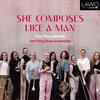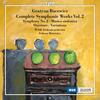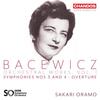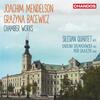View all recordings of works by this composer
Arabic Songs (3) (1)Bells and Small Bells (1)
By the great and clear waters (1)
Caprice no.3 for violin and piano (1)
Caprices (4) for solo violin (1)
Cello Concerto no.1 (1)
Cello Concerto no.2 (1)
Concert Etude (1949) (1)
Concert Etudes (10) for Piano (1)
Concert Krakowiak (1)
Concertino in G major for violin and piano (1)
Concerto for 2 pianos (1)
Concerto for String Orchestra (9)
Dances (3) (1)
Divertimento for String Orchestra (2)
Easy Duets on Folk Themes for 2 violins (1)
Etudes (2) on Double Notes (1)
Humoresque (3)
I Have a Headache (1)
It's Night (1)
Kaprys polski for violin solo (1)
Kolysanka (Lullaby), for violin and piano (2)
Legend for violin and piano (1)
Little Magpie (1)
Little Triptych (1)
Mazovian Dance for violin and piano (arr. Jarle Storlokken) (1)
Mazovian Dance for violin and piano (1)
Melodia for violin and piano (1)
Mow do mnie, o mily (1)
Musica sinfonica in tre movimenti (1)
Music for Strings, Trumpets and Percussion (2)
Oberek no.1 (arr. Jarle Storlokken) (1)
Oberek no.1 (5)
Oberek no.2 (1)
Overture (4)
Parting (1)
Partita (3)
Piano Concerto (2)
Piano Quintet no.1 (arr. chamber orchestra) (1)
Piano Quintet no.1 (3)
Piano Quintet no.2 (3)
Piano Sonata (1930) (1)
Piano Sonata no.1 (3)
Piano Sonata no.2 (3)
Piesni do slow arabskich z x wieku (3) (1)
Polish Caprice (arr. Andrzej Orkisz for solo cello) (1)
Polish Caprice no.1 (1)
Polish Caprice (2)
Polish Dance for Violin and Piano (1)
Quartet for 4 cellos (1)
Quartet for 4 violins (1)
Quatuor (a cordes) (1)
Roze (Roses) (1)
Rozstanie (1)
Scherzo for piano (1)
Sinfonietta for String Orchestra (2)
Slavonic Dance for violin and piano (2)
Smuga cienia (1)
Sonata da camera (1)
Sonata for solo violin (1)
Sonata no.2 for solo violin (4)
Song for violin and piano (1)
Speak to me, my dear (1)
String Quartet (1929-30) (1)
String Quartet no.1 (2)
String Quartet no.2 (2)
String Quartet no.3 (2)
String Quartet no.4 (4)
String Quartet no.5 (2)
String Quartet no.6 (2)
String Quartet no.7 (2)
Studies (2) for Double Notes (1)
Suite for 2 violins (1)
Symphony for String Orchestra (3)
Symphony no.2 (1)
Symphony no.3 (2)
Symphony no.4 (2)
The Shadow Line (1)
Theme with Variations (1)
Variations for orchestra (1)
Violin Concerto no.1 (2)
Violin Concerto no.2 (1)
Violin Concerto no.3 'Highland' (1)
Violin Concerto no.4 (1)
Violin Concerto no.5 (1)
Violin Concerto no.7 (1)
Violin Sonata no.1 'da camera' (1)
Violin Sonata no.2 (3)
Violin Sonata no.3 (3)
Violin Sonata no.4 (7)
Violin Sonata no.5 (4)
Wind Quintet (1)
Witraz (Stained-Glass Window) (1)

Grażyna Bacewicz (5 February 1909 – 17 January 1969) was a Polish composer and violinist. She is only the second Polish female composer to have achieved national and international recognition, the first being Maria Szymanowska in the early 19th century.
Bacewicz was born in Łódź. Her father, Wincenty Bacewicz, gave Grażyna her first piano and violin lessons. In 1928 she began studying at the Warsaw Conservatory, where she studied violin with Józef Jarzębski and piano with Józef Turczyński, and composition with Kazimierz Sikorski, graduating in 1932 as a violinist and composer. She continued her education in Paris, having been granted a stipend by Ignacy Jan Paderewski to attend the École Normale de Musique, and studied there in 1932–33 with Nadia Boulanger (composition) and André Touret (violin). She returned briefly to Poland to teach in Łódź, but returned to Paris in 1934 in order to study with the Hungarian violinist Carl Flesch.
After completing her studies, Bacewicz took part in numerous events as a soloist, composer, and jury member. From 1936 to 1938 she was the principal violinist of the Polish Radio Orchestra, which was directed then by Grzegorz Fitelberg. This position gave her the chance of hearing a lot of her own music. During World War II, Bacewicz lived in Warsaw, though she fled with her family to Lublin at the time of the Warsaw uprising.She continued to compose, and gave underground secret concerts (premiering her Suite for Two Violins).
After the war, she took up the position of professor at the State Conservatory of Music in Łódź. At this time she was shifting her musical activity towards composition, drawn by her many awards and commissions. Composition finally became her only occupation in 1954 after serious injuries in a car accident. She died in Warsaw, Poland.
* This text is available under the Creative Commons Attribution-ShareAlike
License
* Wikipedia® is a registered trademark of the Wikimedia Foundation, Inc., a non-profit organization.
* Original page
Recent Bacewicz releases

Bacewicz, Enescu, Ysaye - Works for Strings
£12.69
(Chandos)

She Composes Like a Man
£12.69
(Lawo Classics)

Bacewicz - Complete Orchestral Works Vol.2
£12.69
(CPO)

Duelles: Bosmans, Bacewicz, Pejacevic, Canal
£13.60
(Mirare)

Bacewicz - Orchestral Works Vol.1: Symphonies 3 & 4, Overture
£11.79
(Chandos)

Forget This Night: Bacewicz, Boulanger, Szymanowski - Songs
£14.51
(7 Mountain Records)

20th-Century Polish Piano Music
£13.60
(Dux)

Stained Glass: 20th-Century Works for Violin & Piano
£12.69
(BIS)

Mendelson & Bacewicz - Chamber Works
£13.88
(Chandos)
 FREE UK SHIPPING OVER £30!
FREE UK SHIPPING OVER £30!